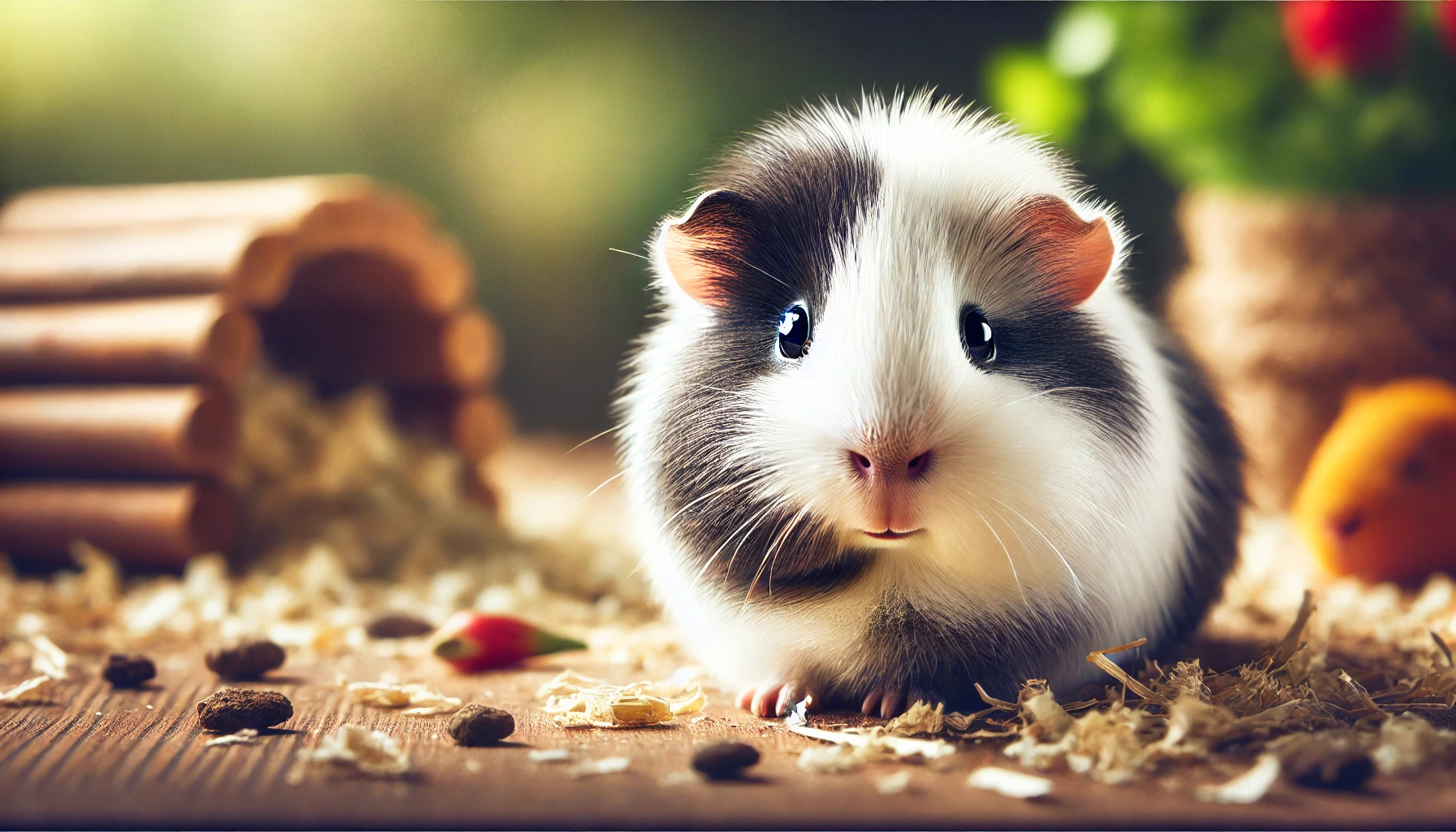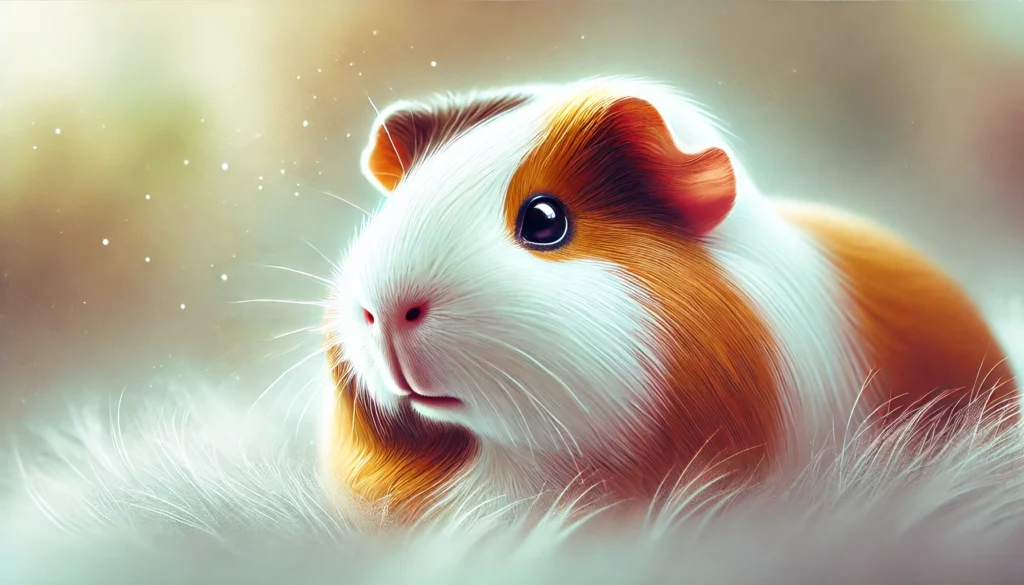How to Care for Your Guinea Pig: A Complete Guide for Pet Parents

Guinea pigs, also known as cavies, are friendly, low-maintenance pets that make great companions. Their playful nature and affectionate personalities make them perfect for families and individuals alike. However, to ensure a pig lives a long, healthy, and happy life, it’s important to provide them with the proper care. This comprehensive guide will cover everything you need to know about pig care, including their habitat, diet, grooming, and general well-being.
What Are Guinea Pigs?
Guinea pigs are small, social animals that originated from the Andes Mountains in South America. These pigs are also called cavies, and there are several different breeds, including rex pigs, skinny pigs, and more. They are herbivores, which means their diet consists mostly of fresh hay, vegetables, and pellets. Despite their small size, pigs are quite active and require daily interaction and a comfortable environment to thrive.
How Long Do Guinea Pigs Live?
One of the most important questions that new pig owners ask is, how long do guinea pigs live? On average, pigs live for 5-7 years, though some can live up to 10 years with proper care. Factors like genetics, diet, living conditions, and healthcare all contribute to their lifespan. Ensuring your pig has a balanced diet and regular vet checkups can help extend their life.
Setting Up the Perfect Guinea Pig Habitat
The first step in caring for your pig is to set up a proper living space. pigs need plenty of room to roam and explore, as well as a safe, comfortable place to sleep.
Choosing the Right Cage
For a guinea pig cage, size matters. A single pig should have a cage that is at least 7.5 square feet. However, larger cages provide more space for them to move around and stay active. Guinea pigs are social creatures, and it’s recommended to keep at least two together, so they can keep each other company.
- Cage Material: Choose a sturdy cage with a wire frame and solid floor. Avoid plastic bases as they may be harmful to their feet and cause injury.
- Bedding: Use safe, absorbent bedding such as paper-based or fleece liners. Avoid cedar or pine wood shavings, as they can harm pigs’ respiratory systems.
- Cage Accessories: Make sure the cage includes a hideout where your pig can retreat for privacy, as well as water bottles, food dishes, and chew toys.
Temperature and Location
Pigs are sensitive to temperature extremes, so it’s important to place their cage in a cool, dry area of the house. The ideal temperature for a guinea pig’s habitat is between 65°F and 75°F. Avoid placing the cage in direct sunlight or near air conditioning units, which can cause temperature fluctuations.

Guinea Pig Diet and Nutrition
A well-balanced diet is one of the key factors in pig care. Pigs are herbivores, and their diet should include fresh hay, vegetables, and pig pellets.
Hay: The Main Component of Their Diet
Hay is the most important part of a pig’s diet. It provides fiber that is essential for digestion and helps keep their teeth healthy. Timothy hay is the best option for most pigs. Pigs need unlimited access to hay at all times. Meadow hay, orchard grass, and oat hay are also good alternatives.
Fresh Vegetables
In addition to hay, fresh vegetables provide important vitamins and minerals, especially vitamin C, which guinea pigs cannot produce on their own. Offer a variety of vegetables, such as:
- Bell peppers (high in vitamin C)
- Carrots (in moderation)
- Romaine lettuce, parsley, and kale
Introduce new vegetables slowly to avoid digestive upset, and always wash them thoroughly before serving.
Guinea Pig Pellets and Vitamin C
High-quality pellets are another essential part of their diet. Choose pig pellets that are specifically formulated with vitamin C and are free from seeds, dried fruit, and nuts, as these can be harmful. Make sure to provide a portion that aligns with the feeding instructions based on your pig’s weight.
Fresh Water
Ensure that your pig has access to clean, fresh water at all times. You can use a water bottle with a sipper tube or a sturdy bowl. Change the water daily to ensure its freshness.
Grooming Your Guinea Pig
Guinea pigs don’t require frequent baths, but they do need regular grooming to keep their coat clean and healthy.
Brushing and Coat Care
If you have a long-haired pig like a Peruvian or Abyssinian, regular grooming is important to prevent mats and tangles. Use a soft brush to gently brush your pig’s coat once a day. For short-haired pigs, brushing once a week is sufficient.
Nail Trimming
Guinea pigs’ nails grow continuously, and they need to be trimmed regularly to prevent overgrowth. Aim to trim their nails every 3-4 weeks. Be careful not to cut too close to the quick, as this can cause bleeding.
Bathing Your Guinea Pig
Pigs don’t need frequent baths. Only bathe them if they get particularly dirty or have a skin issue. Use pet-safe shampoos designed for small animals, and be sure to dry them thoroughly afterward.
10 facts about guinea pigs:
| No. | Fact |
| 1 | Guinea pigs originate from the Andes in South America. |
| 2 | They are social animals and prefer living in groups. |
| 3 | Guinea pigs communicate through various sounds like wheeking and purring. |
| 4 | They require vitamin C in their diet as they can’t produce it themselves. |
| 5 | A guinea pig’s teeth never stop growing. |
| 6 | They can live up to 8 years with proper care. |
| 7 | Guinea pigs are born with fur and open eyes. |
| 8 | They are known for their good-natured temperament. |
| 9 | Guinea pigs need large cages and daily exercise. |
| 10 | They are crepuscular, meaning most active during dawn and dusk. |
Health and Veterinary Care for Guinea Pigs
Routine vet visits are crucial to keeping your Pig healthy. Many vets specialize in small animals, so find a cavy vet who understands the specific needs of pigs.
Common Health Issues in Guinea Pigs
Some common health issues that guinea pigs may face include:
- Dental problems: Since their teeth grow continuously, pigs need plenty of hay and chew toys to wear down their teeth.
- Respiratory infections: pigs are sensitive to drafts, poor ventilation, and dirty bedding, all of which can lead to respiratory infections.
- Skin issues: Dry skin, fungal infections, or mites can affect pigs, particularly if they are stressed or not groomed properly.
Regular checkups can help detect issues early and keep your pig healthy.
Signs of Illness
Look out for these signs that your pig may be sick:
- Loss of appetite
- Weight loss
- Discharge from the eyes or nose
- Excessive sneezing
- Diarrhea
If you notice any of these symptoms, contact a vet immediately.
Mental Stimulation and Socialization
Guinea pigs are very social animals and require mental stimulation and companionship. Ideally, you should have more than one pig, as they thrive in pairs or small groups.
Playtime and Interaction
Spend time each day interacting with your pig. They love being petted and held, but they may need some time to get used to human contact. Gently pick them up and hold them close to your chest to make them feel secure. Guinea pigs also enjoy exploring tunnels, toys, and hideaways that you can add to their cage.
Toys and Enrichment
Providing chew toys, tunnels, and hideaways will keep your guinea pig mentally stimulated. They enjoy having space to run, hide, and explore. You can create DIY toys from cardboard boxes or purchase small animal toys from pet stores.
Do You Know
Anal glands in cats are two small sacs located on either side of the anus, at around the 4 and 8 o’clock positions. These glands produce a strong-smelling fluid used for scent marking. Every time a cat defecates, a small amount of this fluid is usually released, leaving a unique scent that helps mark their territory.
Conclusion
Caring for a guinea pig can be a rewarding experience, as these adorable animals make wonderful, affectionate pets. With the right habitat, a balanced diet, regular grooming, and veterinary care, your guinea pig can live a long, healthy life. Remember, pigs are social creatures, so be sure to provide them with companionship and plenty of attention to keep them happy and active. By following this comprehensive guide to pig care, you’ll be well-equipped to provide the best care for your furry friend.
How do you take care of a guinea pig for beginners?
Caring for a pig requires providing a spacious cage, proper bedding, and a diet rich in hay, fresh vegetables, and pellets. Ensure they have constant access to clean water and hay. Their living area must be cleaned regularly, and they need daily interaction and exercise outside their cage to stay happy and healthy. Regular health checks are crucial to monitor for common issues like dental problems or respiratory infections.
Are guinea pigs easy to maintain?
Guinea pigs are relatively easy to maintain but do require daily care and attention. They need a clean environment, a balanced diet, and regular interaction to thrive. While their daily maintenance is straightforward, they do best with consistent routine care, making them a great choice for those willing to invest time in regular upkeep.
How can I treat my guinea pig at home?
Most guinea pig ailments, like mild skin irritations or digestive disturbances, can often be managed at home with proper care and adjustments in diet or environment. However, for serious conditions or if your pig stops eating, appears lethargic, or shows signs of pain, it is crucial to consult a veterinarian. Preventive measures include maintaining cleanliness, providing a balanced diet, and regular health monitoring.
What keeps guinea pigs happy?
Guinea pigs are social animals that thrive on interaction. Keeping them in pairs, providing a spacious and stimulating environment with toys, hideouts, and chewable items, and regular handling and gentle play keep them happy. A varied diet with plenty of fresh vegetables and unlimited hay also contributes to their well-being.
Can 1 guinea pig live alone?
While pigs can technically live alone, it’s not recommended. They are social creatures and can become lonely and depressed without companionship. Ideally, they should be kept in pairs or small groups of the same sex to promote social interaction and emotional health.
What can guinea pigs not eat?
Guinea pigs should not eat chocolate, caffeine, or anything containing sugar or dairy products. They also should avoid most meats, onions, garlic, and anything potentially toxic like houseplants. Additionally, iceberg lettuce and too much fruit can cause digestive issues and should be limited.
What not to do when owning a guinea pig?
Do not house guinea pigs in small or cramped cages. Avoid feeding them inappropriate foods like meat, dairy, or sugary treats. Do not ignore their need for daily exercise and social interaction. Never bathe pigs unless absolutely necessary as it can cause stress. Regularly ignoring their health can lead to serious issues.
What is the easiest pet to care for?
Among small pets, guinea pigs are relatively easy to care for, though they do require a commitment to daily feeding, weekly cage cleaning, and regular health checks. Other easy pets might include betta fish or certain reptiles, which often require less daily interaction.
What is a guinea pig’s diet?
A guinea pig’s diet should consist primarily of hay, which aids in digestion and dental health. They also need a steady supply of vitamin C, which can be found in specially formulated pellets and fresh vegetables like bell peppers and broccoli. Fresh water should be available at all times.
How long can guinea pigs be left alone?
Guinea pigs should not be left alone for more than 24 hours. They need daily feeding and fresh water. If you need to be away, it’s best to have a pet sitter check on them at least once a day to ensure they have everything they need.
How do I gain my guinea pig’s trust?
Gaining a guinea pig’s trust involves consistent, gentle handling. Spend time daily sitting with your pig, offering treats from your hand, and speaking softly. Avoid sudden movements and loud noises. Patience and regular, calm interactions will help build trust over time.
Are guinea pigs easy to keep alive?
With proper care, guinea pigs can be relatively easy to keep alive and healthy. They need a proper diet, a clean environment, and regular veterinary care to prevent common health issues. Understanding their needs and providing a nurturing environment are key to their longevity.
How to potty train a guinea pig?
Potty training a guinea pig involves placing a litter box in the corner of the cage they most frequently use to relieve themselves. Use a different type of bedding in the litter box than in the rest of the cage, and place some of their droppings into the box to encourage them to use it. Be patient and reward them with treats when they use the box. Consistency is key, and while not all pigs will learn to use a litter box, many can pick up the habit.

